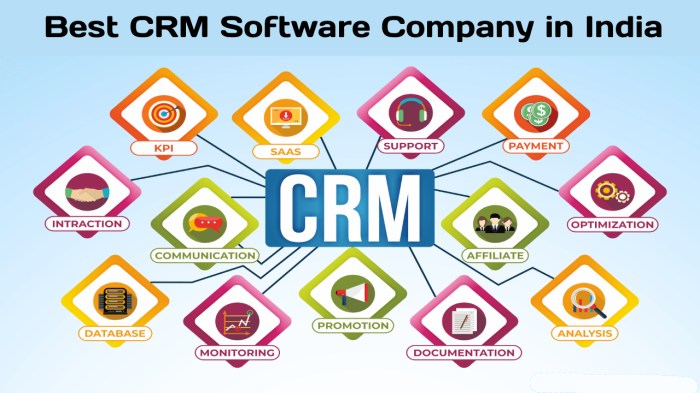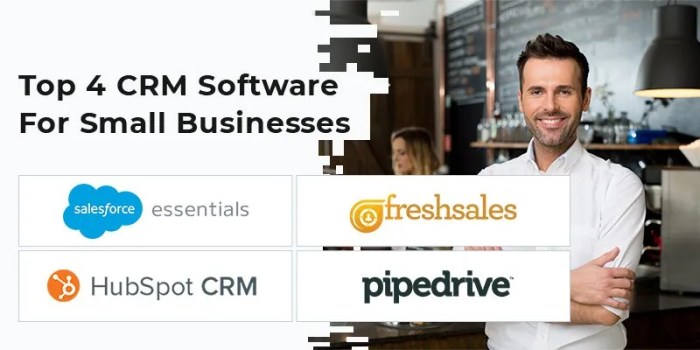Best crm software for large business – Choosing the right Customer Relationship Management (CRM) software is crucial for large businesses. A robust CRM system can streamline operations, improve customer engagement, boost sales, and ultimately drive significant revenue growth. However, with a plethora of options available, selecting the ideal platform can feel overwhelming. This comprehensive guide will delve into the key features, considerations, and top contenders for large enterprise CRM solutions, helping you make an informed decision.
Understanding the Needs of Large Businesses
Large businesses have unique CRM requirements that differ significantly from smaller enterprises. They typically need solutions that can handle:
- High Volume of Data: Managing vast amounts of customer data, including interactions, transactions, and support tickets, requires a scalable and efficient CRM.
- Complex Sales Processes: Long and intricate sales cycles often necessitate advanced features like opportunity management, sales forecasting, and pipeline analysis.
- Multiple Departments and Users: Seamless integration across various departments (sales, marketing, customer service) and user roles is paramount for efficient collaboration.
- Robust Security and Compliance: Protecting sensitive customer data and adhering to industry regulations (e.g., GDPR, CCPA) is non-negotiable.
- Customizable Workflows: Large businesses often have unique processes that require a CRM with extensive customization options.
- Advanced Reporting and Analytics: Detailed reporting and insightful analytics are vital for data-driven decision-making and performance tracking.
- Integration with Existing Systems: Seamless integration with existing enterprise resource planning (ERP) systems, marketing automation platforms, and other business tools is essential.
Key Features to Look for in a Large Business CRM
Beyond the basic functionalities, several key features differentiate a good CRM from a great one for large organizations:
Sales Force Automation (SFA)
Efficient SFA tools are essential for managing leads, tracking opportunities, and automating sales processes. Look for features such as:
- Lead Management: Capturing, qualifying, and nurturing leads effectively.
- Opportunity Management: Tracking deals, forecasting revenue, and managing sales pipelines.
- Contact Management: Centralized storage and management of customer contact information.
- Sales Forecasting: Predicting future sales based on historical data and current trends.
Marketing Automation, Best crm software for large business
Integrating marketing automation capabilities within your CRM allows for targeted campaigns, personalized communications, and improved customer engagement. Key features include:
- Email Marketing: Sending targeted email campaigns and tracking open and click-through rates.
- Campaign Management: Planning, executing, and analyzing marketing campaigns.
- Social Media Integration: Monitoring social media activity and engaging with customers.
- Marketing Analytics: Tracking marketing ROI and optimizing campaigns for better results.
Customer Service and Support
Excellent customer service is critical for retaining customers. A robust CRM should facilitate efficient support processes through:
- Case Management: Tracking and resolving customer issues efficiently.
- Knowledge Base: Providing customers with self-service options and readily available information.
- Live Chat: Offering real-time support to customers.
- Customer Feedback Management: Collecting and analyzing customer feedback to improve service quality.
Reporting and Analytics
Data-driven decision-making is crucial for large businesses. The CRM should offer:
- Customizable Dashboards: Presenting key performance indicators (KPIs) in a clear and concise manner.
- Advanced Reporting: Generating detailed reports on sales, marketing, and customer service performance.
- Predictive Analytics: Using data to predict future trends and customer behavior.
Top CRM Software for Large Businesses
Several CRM platforms cater specifically to the needs of large enterprises. Here are some of the leading contenders:
- Salesforce Sales Cloud: A highly scalable and customizable platform with a wide range of features. It’s known for its robust ecosystem of apps and integrations. [Source: Salesforce Sales Cloud ]
- Microsoft Dynamics 365: A comprehensive suite of business applications, including a powerful CRM solution that integrates seamlessly with other Microsoft products. [Source: Microsoft Dynamics 365 ]
- Oracle Siebel CRM: A mature and robust platform ideal for complex sales processes and large datasets. Known for its strong enterprise-level features. [Source: Oracle Siebel CRM (Note: Information may be limited as Siebel is an older platform, but its legacy remains in many large enterprises.)]
- SAP CRM: Integrated with SAP’s broader ERP suite, this CRM offers strong capabilities for large businesses operating within the SAP ecosystem. [Source: SAP CRM ]
- HubSpot CRM (Enterprise): While known for its SMB offerings, HubSpot’s enterprise plan provides features suitable for larger businesses, especially those focusing on inbound marketing and sales. [Source: HubSpot CRM ]
Note: The best CRM for your business will depend on your specific needs, budget, and existing infrastructure. It’s recommended to conduct thorough research and potentially request demos from several vendors before making a decision.

Source: whsuites.com
Choosing the Right CRM: Factors to Consider
- Scalability: Ensure the CRM can handle your current and future data volume and user base.
- Integration Capabilities: Check for seamless integration with your existing systems.
- Customization Options: Assess the CRM’s ability to adapt to your unique business processes.
- Security and Compliance: Verify the CRM’s security measures and compliance certifications.
- Cost: Consider the initial investment, ongoing maintenance costs, and potential ROI.
- Vendor Support: Evaluate the vendor’s reputation, customer support, and training resources.
Frequently Asked Questions (FAQ)
- Q: What is the average cost of a CRM for large businesses? A: The cost varies significantly depending on the vendor, features, and number of users. Expect to invest a substantial amount, ranging from thousands to tens of thousands of dollars annually.
- Q: How long does it take to implement a large business CRM? A: Implementation time can range from several months to a year or more, depending on the complexity of the system and the size of the organization.
- Q: What are the key metrics to track with a CRM? A: Key metrics include sales conversion rates, customer acquisition cost, customer lifetime value, customer satisfaction, and revenue growth.
- Q: How can I ensure data security with a CRM? A: Choose a CRM vendor with robust security measures, including data encryption, access controls, and regular security audits. Adhere to industry best practices for data protection.
- Q: What is the difference between cloud-based and on-premise CRM? A: Cloud-based CRMs are hosted on the vendor’s servers, offering greater flexibility and scalability. On-premise CRMs are installed on your own servers, providing more control but requiring more IT resources.
Conclusion
Selecting the right CRM for a large business is a strategic decision with long-term implications. By carefully considering the factors discussed above and evaluating the leading CRM platforms, you can find a solution that empowers your organization to improve customer relationships, boost sales, and achieve sustainable growth.
Call to Action
Ready to transform your business with a powerful CRM solution? Contact us today for a free consultation to discuss your specific needs and explore the best options for your enterprise.
Questions and Answers: Best Crm Software For Large Business
What are the key features to look for in a CRM for a large business?

Source: commercient.com
Scalability, robust reporting and analytics, advanced automation capabilities, seamless integration with other business systems, and strong security features are essential.
How much does CRM software for large businesses typically cost?
Pricing varies significantly depending on the features, number of users, and vendor. Expect a substantial investment, but consider the ROI in terms of increased efficiency and revenue.
What is the typical implementation timeline for a large-scale CRM deployment?
Implementation can take several months, depending on the complexity of the system and the size of the organization. Careful planning and project management are crucial.
How can I ensure my CRM data is secure?
Choose a vendor with robust security measures, including data encryption, access controls, and regular security audits. Implement strong internal data governance policies as well.
